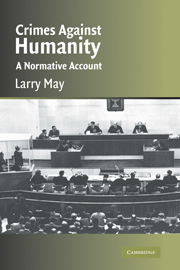Book contents
- Frontmatter
- Contents
- Acknowledgments
- A UNIVERSAL NORMS AND MORAL MINIMALISM
- B PRINCIPLES OF INTERNATIONAL CRIMINAL LAW
- 4 The Security Principle
- 5 The International Harm Principle
- 6 International Crime: The Case of Rape
- C PROSECUTING INTERNATIONAL CRIMES
- D DEFENSES AND ALTERNATIVES
- Conclusions
- Notes
- Bibliography
- Index
4 - The Security Principle
Published online by Cambridge University Press: 23 November 2009
- Frontmatter
- Contents
- Acknowledgments
- A UNIVERSAL NORMS AND MORAL MINIMALISM
- B PRINCIPLES OF INTERNATIONAL CRIMINAL LAW
- 4 The Security Principle
- 5 The International Harm Principle
- 6 International Crime: The Case of Rape
- C PROSECUTING INTERNATIONAL CRIMES
- D DEFENSES AND ALTERNATIVES
- Conclusions
- Notes
- Bibliography
- Index
Summary
In this chapter, I will provide a moral argument that grounds jus cogens norms and that partially justifies international prosecutions. In the last chapter, we saw that the attempt to ground universal norms in consensually based custom is doomed, unless custom, including opinio juris, is combined with moral support. In this chapter and the next, I will supply that support by arguing that a norm of international law is jus cogens if it satisfies two principles – the security principle and the international harm principle.
The argument of this chapter begins with a return to moral minimalist principles having to do with self-defense and self-preservation as the support for the security principle. This principle opens the door for otherwise prohibited intrusions into State sovereignty. Then, to justify fully international criminal prosecutions, I turn to another principle, the international harm principle, which will justify specific intrusions into a sovereign State to prosecute certain crimes. The main basis of the international harm principle is the requirement that if there is a fully functioning State, in order for a crime to be prosecuted in an international tribunal, that crime must be group-based, in one of two senses I will later discuss. Violations of the security principle may be sufficient to justify humanitarian intervention into the affairs of a State. But in order to justify the likely infringement of liberty of individuals that comes from trials, satisfying an additional justificatory principle is necessary.
- Type
- Chapter
- Information
- Crimes against HumanityA Normative Account, pp. 63 - 79Publisher: Cambridge University PressPrint publication year: 2004

